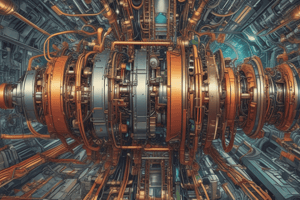Podcast
Questions and Answers
Which type of process involves constant pressure?
Which type of process involves constant pressure?
- Isothermal
- Isochoric
- Adiabatic
- Isobaric (correct)
In mechanical engineering, what area does thermodynamics assist in optimizing engine cycles?
In mechanical engineering, what area does thermodynamics assist in optimizing engine cycles?
- HVAC systems
- Internal Combustion Engines (correct)
- Refrigeration systems
- Gas Turbine Design
Which thermodynamic cycle describes the operation of gas turbines?
Which thermodynamic cycle describes the operation of gas turbines?
- Stirling Cycle
- Brayton Cycle (correct)
- Rankine Cycle
- Carnot Cycle
What is the main purpose of the Carnot Cycle?
What is the main purpose of the Carnot Cycle?
What is a key area of focus for the future of thermodynamics in mechanical engineering?
What is a key area of focus for the future of thermodynamics in mechanical engineering?
Which type of process involves constant volume?
Which type of process involves constant volume?
What does the First Law of Thermodynamics state?
What does the First Law of Thermodynamics state?
Which law of thermodynamics implies that the entropy of an isolated system will always increase or remain constant?
Which law of thermodynamics implies that the entropy of an isolated system will always increase or remain constant?
What are thermodynamic properties?
What are thermodynamic properties?
What happens to the entropy of a pure crystalline substance at absolute zero?
What happens to the entropy of a pure crystalline substance at absolute zero?
Under what condition must two systems be in thermal equilibrium with each other according to the Zeroth Law of Thermodynamics?
Under what condition must two systems be in thermal equilibrium with each other according to the Zeroth Law of Thermodynamics?
What kind of changes do thermodynamic processes involve?
What kind of changes do thermodynamic processes involve?
Flashcards are hidden until you start studying
Study Notes
Mechanical Engineering: Exploring Thermodynamics
Mechanical engineering is a vast and diverse field that deals with the design, analysis, and manufacturing of mechanical systems. One of the core disciplines within this realm is thermodynamics, which focuses on the study of energy conversion processes and how energy is transferred and transformed in mechanical systems.
The Fundamentals of Thermodynamics
Thermodynamics provides a framework for understanding how energy flows in and through mechanical systems. The key ideas in thermodynamics can be summarized as follows:
-
Laws of Thermodynamics: These consist of four fundamental laws that govern energy interactions and conversions:
- First Law: Energy can neither be created nor destroyed, but it can be transformed and transferred from one form to another.
- Second Law: The total entropy of an isolated system will always increase or remain constant.
- Third Law: At absolute zero, the entropy of a pure crystalline substance reaches its minimum value.
- Zeroth Law: If two systems are in thermal equilibrium with a third, they must also be in thermal equilibrium with each other.
-
Thermodynamic Properties: These are the measurable characteristics of matter and energy that describe the state of a system, such as temperature, pressure, and internal energy.
-
Thermodynamic Processes: These are changes in the state of a system involving one or more thermodynamic properties. Classifications of processes include:
- Adiabatic: No heat transfer
- Isochoric: Constant volume
- Isobaric: Constant pressure
- Isothermal: Constant temperature
Applications of Thermodynamics in Mechanical Engineering
Thermodynamics plays a crucial role in numerous areas within mechanical engineering, such as:
-
Heating, Ventilation, and Air Conditioning (HVAC): Thermodynamics helps engineers design and optimize heating, cooling, and ventilation systems for buildings and vehicles.
-
Internal Combustion Engines: Thermodynamics assists in the optimization of engine cycles and the design of more efficient engines.
-
Refrigeration and Air Conditioning: Thermodynamics guides engineers in understanding and designing systems that move heat from one place to another.
-
Turbine and Gas Turbine Design: Thermodynamics assists in the design and optimization of power generation systems, such as steam turbines and gas turbines.
-
Energy Conversion and Storage: Thermodynamics is instrumental in designing and optimizing energy conversion and storage devices, such as batteries and fuel cells.
Thermodynamic Cycles and Principles
Thermodynamic cycles are repeated sequences of thermodynamic processes used to analyze the performance of various energy conversion devices. Some of the most common thermodynamic cycles include:
-
Carnot Cycle: This ideal cycle is a theoretical model for the most efficient heat engine, based on the Second Law of Thermodynamics.
-
Rankine Cycle: This cycle describes the operation of steam power plants, which convert heat into mechanical work.
-
Brayton Cycle: This cycle, also known as the Joule cycle, describes the operation of gas turbines, which convert heat into mechanical work.
-
Stirling Cycle: This cycle describes the operation of external combustion engines, which convert heat into mechanical work without directly burning fuel in the engine chamber.
The Future of Thermodynamics in Mechanical Engineering
As mechanical engineering continues to evolve, thermodynamics will remain a vital tool for pushing the boundaries of energy conversion and utilization. Some areas of focus include:
-
Energy Storage: Developing new energy storage technologies that can efficiently capture, store, and release energy when needed.
-
Renewable Energy: Exploring new ways to harness renewable energy sources, such as solar, wind, and hydroelectric power, to produce clean and sustainable energy.
-
Energy-Efficient Design: Optimizing the design of mechanical systems to minimize energy consumption and improve overall efficiency.
-
Carbon Capture and Storage: Developing new technologies and methods for capturing and storing carbon emissions to mitigate the impact of human activities on the environment.
By understanding and applying the principles of thermodynamics, mechanical engineers will continue to push the boundaries of energy conversion and utilization, making our world more efficient, sustainable, and livable.
Studying That Suits You
Use AI to generate personalized quizzes and flashcards to suit your learning preferences.





